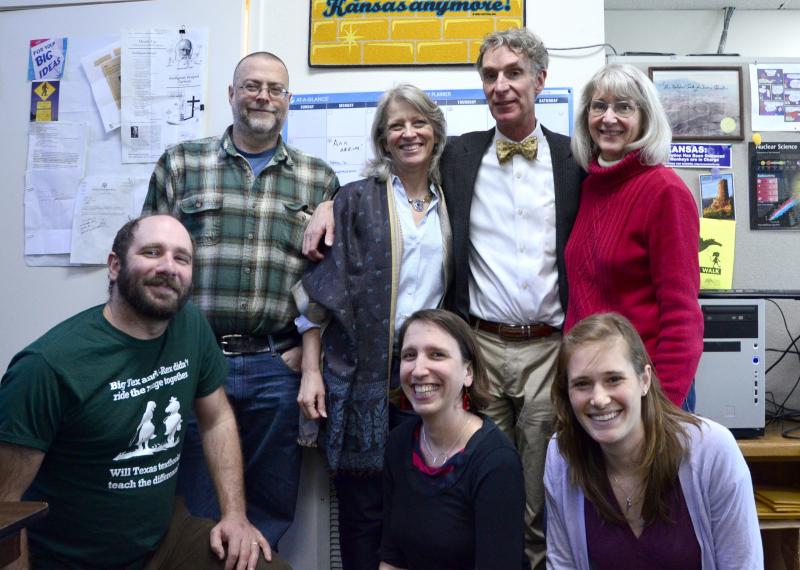
Back left: Glenn Branch, Ann Reid, Bill Nye, Genie Scott
Front left: Joshua Rosenau, Minda Berbeco, Lindsay Miller
What's it like to intern with the National Center for Science Education? Lindsay Miller, a current NCSE intern and undergraduate student at Northwestern University, shares her insights.
When I first arrived in Oakland to begin my internship with the National Center for Science Education (NCSE), I imagined myself sitting quietly at a desk, churning out bits of information that may or may not ever be useful to the staff. That was my basic image of an internship: a position that allowed students to catch glimpses of the inner workings of organizations, while mostly trying to stay out of the way of the “real scientists”.
My experience could not have been more different.
After only a week, I stopped by a restaurant after work and settled down with Genie Scott’s book, Evolution vs. Creationism. I was conscious of the fact that from the cover, the purpose of the book was pretty ambiguous: was it a book explaining the merits of evolution education or one advocating that educators “teach both sides?” Still, I didn’t imagine any of the hungry customers would notice or take interest in the subject. Boy was I wrong.
Ten minutes after I cracked the spine and began to peruse Genie’s years of research, I was approached by a middle-aged professor who eyed the cover, then leaned over and quietly asked me, “What side are you on?”
I gave myself a mental slap in the forehead for not having brought a book cover. I wasn’t prepared to defend evolution education to a creationist. I didn’t even know where to begin; should I bring up vestigial structures? The eye?
“Evolution”, I responded. Then, before he could say anything more, I finished with “I’m interning at the National Center for Science Education in Oakland”. I hoped he would accept that and move on.
Instead, he stuck out his hand and shook mine. “Congratulations! I’m a member of NCSE! That must be Genie’s book!”
I was shocked. NCSE members were really out there, and were active. Standing in front of me was a UC Berkeley professor who obviously cared deeply about evolution education, and was emphatic in his support of NCSE. The network of members and educators that had previously seemed so abstract suddenly came to life. At that moment I realized the tangible impact of NCSE, and the merit of connecting members with interns and teachers with much-needed support when confronted with science denial.
I quickly discovered that each day at NCSE reflected this dynamic network of individuals, conversations, projects and research. From day one, I was completely immersed in NCSE’s mission to defend and promote the teaching of good science nationwide. I experienced (and contributed to!) the development of the website, Understanding Global Change, that I believe will fundamentally affect how teachers are able to communicate our climate crisis to their students. I experienced the matrix of grants and grant proposals, and dove into conversations with the staff.
As the weeks wore on, I got to experience a constant stream of conversations from my makeshift office in the corner of the kitchen—conversations ranging from Marx to Cosmos, from Milankovitch cycles to backpacking adventures. This central perspective gave me a unique (and often comical) insight into what makes NCSE such a successful organization. The diversity of NCSE’s staff members, who specialize in biology, climate science, geology, and theology, allows them to formulate complex solutions and generate innovative resources. It is these conversations between diverse individuals that will eventually enable science teachers to integrate new ideas into their classrooms.
As this week draws to a close, I say goodbye to the semester and to my internship with NCSE. But I don’t say goodbye to the science, or to the notion of keeping good science in classrooms and bad science out. I don’t say goodbye to the staff, who I know will continue to pour every ounce of energy and their diverse skills into continuing their mission. And I don’t say goodbye to my interest in climate change education, which I will continue to pursue when I return to school in the fall. Because in the end, that’s what NCSE is all about—empowering individuals to continue this mission in their own lives and throughout their own communities.
